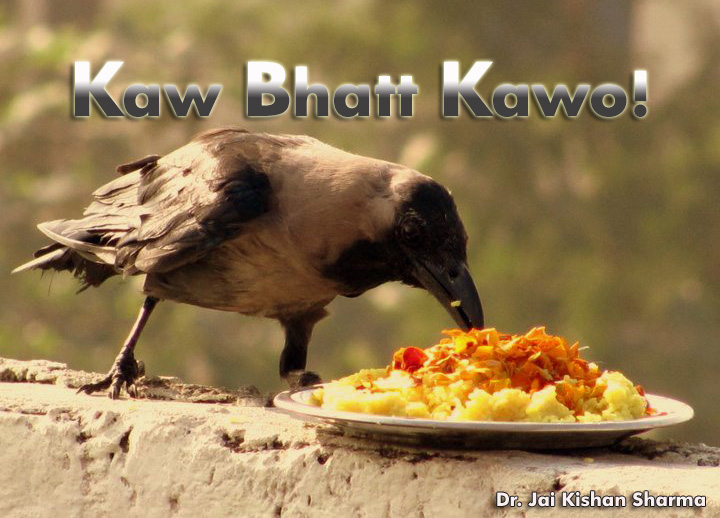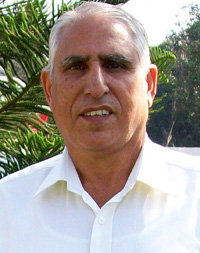 Image courtesy: Vishal Raina |
|
Before the exodus from the valley, Kashmiri Pandits used to celebrate ‘Kaw Punim’ every year. There was special kind of charm associated with ‘Kaw Punim’. Children used to wait anxiously for this occasion. They would make ‘Kaw Potul’ (a hand type ladle/spoon made of a long stick and hay) for pious offerings to crows from the window of upper storey or balcony of their respective houses. While offering the food, the children would chant -
Kaw Bhatt Kawo,
Khechrey Kawo. Gangabala Sharana Karith, Gurey Mechey Tyoka Karith. Walbha Saney Larey Pyeth, Dal Bata Khyene.
It means, “O erudite crow! O Khichri (a mixture of rice and moong dal cooked together) eater! After having a dip in river Ganga, put tilak (of clay) on your forehead and come to our house to have dal and rice.”
In Kashmir, the women of each and every Kashmiri Pandit family used to offer fresh cooked food to crows every day before serving it to the family members. She would not even taste it to confirm the quality of dish. A ‘Kaw Paet’ (smooth wooden piece) hanging on the front wall of a house signified that that particular house belongs to Kashmiri Pandit.  Many
myths are attached with crow in Hindu mythology. One of the myths is of
Kak-Bhushandi, who was a pious man devoted to Lord Ram but he was
cursed to become a crow. The crow is considered to be very curious
animal. Kak-Cheshta and Kak-Snaan are the idiomatic
expressions of curiosity and bathing like a crow (crow only dips his
head while having bath) respectively in Sanskrit language. Many
myths are attached with crow in Hindu mythology. One of the myths is of
Kak-Bhushandi, who was a pious man devoted to Lord Ram but he was
cursed to become a crow. The crow is considered to be very curious
animal. Kak-Cheshta and Kak-Snaan are the idiomatic
expressions of curiosity and bathing like a crow (crow only dips his
head while having bath) respectively in Sanskrit language. According to Hindu belief, crows are the representatives of our ancestors, planet Saturn, Yama, Dharamraja and Krishna. By offering food to crows, they get pleased. The Nilmat Puran which is our source of cultural history says, “Pournmasyam Tu Maaghsya Shraadam Kritva Tiler-narah, Kakanaam Bhojnam Dadyaat Prabhootam Bali Sanyutam.” (Verse 516) It means, “On full moon night of Maagh, a man should perform Shraadh with sesame and give enough food consisting of pious offerings to crows.” It is also believed that ‘Kaw Punim’ is birthday of the crow. Hindus see God in many creatures; be it crow, snake, or human being. As such offering food to crows is equal to Jeeva-Karuna i.e. having pity on every creature. Also, it is equivalent to Bhoot-Yajna i.e. one of Panch Mahayajnas (fivefold duties) a family man should perform every day. I think crows serve as a hot line medium between living and deceased ones. Therefore, we should maintain the tradition of offering food to crows and other animals to make the departed ones happy so that they shower their blessings and good wishes upon us. The ubiquitous crow does not eat alone but along with his fellows. This activity of crow is indicative of fellow feeling and community care. The Kashmiri Pandit community may not be celebrating this festival with great charm due to uprooting from their homeland or advancement of western culture but its significance is even much more relevant today when human values have faded away. Let it be either out of sheer compassion or out of blind beliefs perpetuated since ages, it is clear that this festival gives us a message that fellow feeling is transacted through collective sharing and community caring which is must for our survival in exile. |
 Dr. Jai Kishan Sharma
is Ph.D. in Kashmir Shaivism from University of Jammu. He has written
research papers and articles for several magazines, journals like
Shiraza, Hamara Sahitya, Dharma Marg etc. He devotes his time in
reading, researching and writing. Dr. Jai Kishan Sharma
is Ph.D. in Kashmir Shaivism from University of Jammu. He has written
research papers and articles for several magazines, journals like
Shiraza, Hamara Sahitya, Dharma Marg etc. He devotes his time in
reading, researching and writing. |
| Copyrights © 2007 Shehjar online and KashmirGroup.com.
Any content, including but not limited to text, software, music, sound,
photographs, video, graphics or other material contained may not be
modified, copied, reproduced, republished, uploaded, posted, or
distributed in any form or context without written permission. Terms & Conditions. The views expressed are solely the author's and not necessarily the views of Shehjar or its owners. Content and posts from such authors are provided "AS IS", with no warranties, and confer no rights. The material and information provided iare for general information only and should not, in any respect, be relied on as professional advice. Neither Shehjar.kashmirgroup.com nor kashmirgroup.com represent or endorse the accuracy or reliability of any advice, opinion, statement, or other information displayed, uploaded, or distributed through the Service by any user, information provider or any other person or entity. You acknowledge that any reliance upon any such opinion, advice, statement, memorandum, or information shall be at your sole risk. |
Sunday, February 9, 2020
Kaw Bhatt Kawo!
Subscribe to:
Post Comments (Atom)

No comments:
Post a Comment